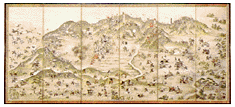By Ryan Klocke, 2/21/07
After a recent ceremony in which he was promoted to a brown belt, Chico State student Greg DeWall was back on the mat, honing the techniques he uses to defeat his opponents. DeWall applied those techniques to go 4-0 in the San Jose Buddhist Sensei Memorial Tournament on Feb. 11. He pinned two opponents, threw one and choked out the other, not letting what would seem to be an insurmountable disadvantage stop him from succeeding. DeWall is blind. His opponents are not. About halfway through his senior year of high school, DeWall said he lost his sight after a “self-inflicted gunshot injury.” “It is a gentle way of saying attempted suicide,” DeWall said. Now, 10 years after the incident, DeWall, 28, is open about what happened. “The pressure and confusion overwhelmed me,” he said. “I didn’t know who to talk to, so I tried to deal with it myself.” DeWall was quick to accept he was blind, but the transition to adapt to life without sight was frustrating. “The hardest thing is relying on other people,” DeWall said. “That’s the bottom line.” Interested in finding a physical activity for fitness and self-defense, DeWall decided to try judo because he had experience in wrestling. He started working out 14 months ago with the Chico Judo Club of Haley’s Martial Arts Center. Judo is about finding a certain quality in yourself and overcoming limitations, said Sensei Dr. Carl Tenckhoff, the club’s head coach. While the club was accepting to him, DeWall recalls apprehension from the instructors about how to teach judo to a blind man. “I remember the first night I saw him I thought, ‘What the heck is going on here?'” Tenckhoff said. But a little more than a year later, DeWall has the ability to turn Tenckhoff “into a pretzel,” Tenckhoff said. Knowing they would have to modify their training methods, the coaches helped teach DeWall by using him as an example for the class, performing different techniques on him so he could feel what they are, DeWall said. Being part of the demonstrations helped DeWall become comfortable on the mat. “That’s what I am there for,” DeWall said with a laugh. “I enjoy that.” But at the beginning, DeWall had a hard time transitioning to a judo mind-set. “I made it harder than it should be, which is the story of my life,” he said. Becoming somewhat comfortable with judo, DeWall decided to start attending tournaments, something he never intended to do when he started. “After every little stepping stone, I felt more comfortable about it,” DeWall said. The competition rules are different when fighting a blind opponent, said Jason Parks, an assistant coach with the judo club. There is a constant-contact rule where the two competitors stay attached to one another during the fight. Judo is a “blind-friendly sport,” DeWall said. Many opponents treat DeWall’s blindness as a huge handicap, Parks said. Having trained with DeWall since he joined the club and competed against blind opponents, Parks knows to take a blind opponent seriously. “When I make a mistake, they can feel it,” he said. But late last year, DeWall hit a slump in competition. He was still relying primarily on his wrestling background to get by, Tenckhoff said. “I knew I had to learn to be more versatile,” DeWall said. Working hard on his techniques, DeWall came back “stronger than ever” in the San Jose tournament and “demolished his opponents,” Tenckhoff said. His four wins in the tournament attracted the attention of the United States Association of Blind Athletes, which approached DeWall about trying out for the U.S. Blind Judo Team. “He looked awesome,” said Willy Cahill, coach of the U.S. Olympic and Paralympics teams. “He has a good shot to qualify.” He was invited to training and trials camp in the beginning of April at the U.S. Olympic Training Center in Colorado Springs, Colo. The trials will provide DeWall with the opportunity to compete and spar against blind opponents, which is something he has never done but is looking forward to. “I enjoy having judo as part of my life, as long as I keep working hard,” DeWall said. A therapeutic recreation major, DeWall said he aims to use his degree to “improve someone’s quality of life.” While he hasn’t narrowed down a certain career, he does have an ultimate goal: buy and live on a houseboat. “Even with all this judo, I would still rather be fishing,” he said. | ||
| ||

